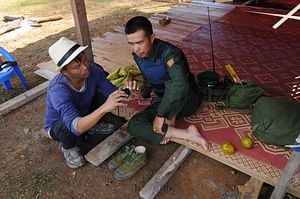My friend and colleague Lawi Weng was arrested by the Myanmar military on June 25, and is being cynically charged with “unlawful association” under an archaic colonial law. A Myanmar national and ethnic Mon journalist, Lawi has repeatedly risked his life to report on military offensives against ethnic minorities in Myanmar.
I met Lawi in 2015 when I was smuggled into the Shan State Army-North headquarters in Wan Hai, northern Myanmar. A government offensive had been underway for two months, displacing and killing civilian farmers and villagers. Lawi and Australian photojournalist Steve Tickner had arrived in Wan Hai earlier the same day, and we were billeted together in the house of an officer. When I met them, Steve and Lawi were hunched over their laptops working to get a story filed on the internal refugee camps they’d visited a few hours before.
Lawi was focused on his work. He was humble and soft-spoken, and never drew attention to himself as he carefully composed the facts, details, and personal stories of those affected by the military offensive into articles that were published almost immediately in Yangon, creating a real-time documentation of the war as it was happening. We visited temples and villages that had been shelled, and met refugees whose family members were shot as they tried to flee government soldiers. Lawi often had to translate during interviews, but never complained that this was increasing his work load or taking time from his own writing. The Tatmadaw (Myanmar military) gave an ultimatum for the Shan army to withdraw from its positions, and villagers began to evacuate en masse in expectation of a government attack with artillery, jet fighters, and helicopter gunships.
Whenever we were preparing to go to the front lines, Lawi would find a Buddhist temple or shrine, kneel down to the earth, and prostrate himself. I was astonished that he was certain enough of the risk to his life to feel he had to pray, and that yet there was no hesitation in proceeding to the front. For myself, it was the first time I had been in a combat zone, and I was too filled with anxiety to think about anything as quiescent as Buddha or Nirvana.
One day as we drove back to our lodging in a pickup full of armed Shan soldiers, we pulled over at a Chinese barbeque restaurant. Lawi had suggested to our army handler that we stop for a beer. It was a relief to sit down and relax away from the officer’s house, where we ate and slept surrounded by uniforms and guns. Since I speak Chinese, I chatted with the sisters who ran the restaurant, and we watched the armed vehicles and farmers’ trucks pass by on the road through town, everybody speculating on when the big attack would come. Steve and Lawi planned to go early in the morning to a ridge above where the attack was expected in order to cover the story. I couldn’t quite believe they were going to willingly put themselves in the path of the Tatmadaw’s Russian gunships and MiG fighters. Steve told me chilling stories about areas of government atrocities he and Lawi had entered elsewhere in Myanmar, often pushing the boundaries of what was safe, or even what was sane. In one case, they had talked their way into a conflict zone to report on government war crimes, and the day after they left another journalist was murdered by the military while trying to follow up on their reporting.
In Wan Hai, Lawi and Steve filed stories every day. In the end, the government’s deadline for the withdrawal of Shan troops came and went. There was no massive attack; the headquarters was not overrun.
In my opinion, the only reason the Tatmadaw did not renew their attack on the Shan headquarters was the publicity brought to the offensive by Lawi’s reporting and Steve’s photos. Considering the instances of murder, gang rape, and theft of village food supplies by the Tatmadaw, I think Lawi was directly responsible for saving dozens or hundreds of lives — who knows how many soldiers and villagers would have been killed if the the shelling and aerial attacks had come as planned. The bravery of these individual journalists, rather than international opinion or action, was what saved lives those days in the beautiful countryside of Shan State.
After the Wan Hai offensive, Lawi returned to Yangon, and continued to file stories from the most dangerous areas in Myanmar. I followed his reporting as it appeared online, as well as his Facebook posts, including a few jokes about how Steve and I had scared away the beautiful female soldiers of the Shan State Army with our bad looks and manners. Lawi was so low-key and unassuming that it was easy to forget that he was literally risking his life and freedom every time he filed a story or went out into the field.
This is the man the Myanmar military has arrested under spurious charges — a devout Buddhist who has quietly worked for years to give a real-time voice to victims of state-sponsored murder, rape, and displacement. Sadly, Lawi is now in danger of becoming a victim of the same state terrorism he has fought to uncover and resist.
Scott Ezell is an American writer and multi-genre artist based in Asia and California.

































